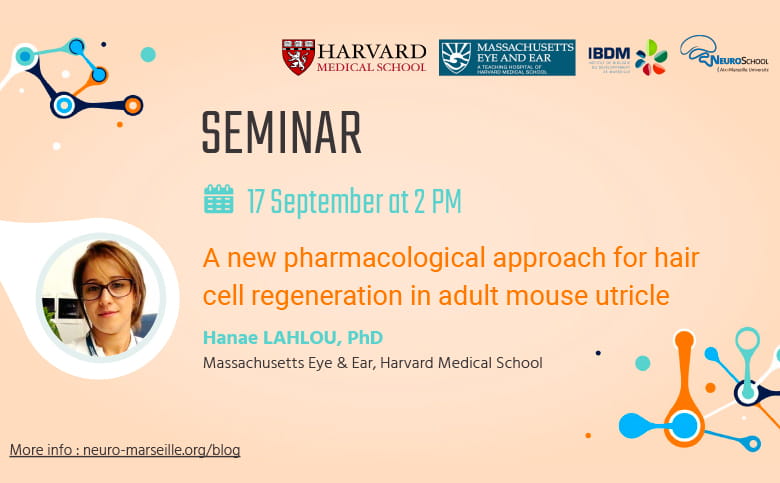Description de la soumission d'un avis

Seminaire: A new pharmacological approach for hair cell regeneration in the adult mouse utricle (diplômée d'AMU)
par Hanae LAHLOU, PhD, Harvard Medical School
A new pharmacological approach for hair cell regeneration in the adult mouse utricle par Hanae Lahlou (en anglais)
Pour le prochain séminaire NeuroSchool, nous avons le plaisir d’accueillir Hanae Lahlou, qui travaille au Massachusetts Eye and Ear – Département d’Otolaryngologie – Chirurgie de la tête et du cou de la Harvard Medical School, Boston (USA). Elle présentera ses recherches sur une nouvelle approche pharmacologique pour la régénération des cellules ciliées dans l’utricule de souris adultes. Le séminaire aura lieu le 17 septembre 2021, à 14 heures (UTC+2), via Zoom.
🗓 17 septembre 2021 à 14 heures (UTC+2)
🕓 Séminaire d’une heure
📌 Attention, étudiants du programme doctoral, merci de vous inscrire via ce formulaire sur Ametice.
L’inscription pour recevoir le lien de connexion se trouve à la fin de cette page.
Register and receive the zoom link
Abstract
The inner ear is a highly specialized sensory organ containing auditory and vestibular hair cells, mechanoreceptors for hearing and balance. Loss of auditory hair cells is clinically irreversible. While vestibular hair cells can regenerate spontaneously in response to damage, their regeneration potential appears limited and declines from a high point in the first postnatal weeks through adulthood. We sought to develop a pharmacological treatment to enhance vestibular hair cell regeneration in the damaged adult utricle. We used adult Pou4f3DTR mice for targeted ablation of hair cells. After in vivo administration of diphtheria toxin, damaged adult utricles were treated in vitro with a combination of a glycogen synthase kinase inhibitor and a histone deacetylase inhibitor, a combination shown previously to stimulate the production of new hair cells in the cochlea. Hair cell regeneration was significantly increased relative to the spontaneous regeneration observed in utricles with damage alone. Lineage tracing of supporting cells showed differentiation into both type I and type II vestibular hair cells. We confirmed these results in vivo, where we injected the same drug combination into damaged adult mouse ears via the semi-circular canal. Ultimately, our work provides new knowledge of the molecular mechanisms required for vestibular hair cell differentiation and may pave the way toward the development of new therapeutic strategies to produce hair cells and restore vestibular function in humans.
Pre-reading papers:
1. Will J. McLean, Xiaolei Yin, Lin Lu, Danielle R. Lenz, Dalton McLean, Robert Langer, Jeffrey M. Karp, and Albert S.B. Edge. Clonal Expansion of Lgr5-Positive Cells from Mammalian Cochlea and High-Purity Generation of Sensory Hair Cells. Cell Reports 2017
2. Wang T, Niwa M, Sayyid ZN, Hosseini DK, Pham N, Jones SM, Ricci AJ, Cheng AG. Uncoordinated maturation of developing and regenerating postnatal mammalian vestibular hair cells. PLoS Biol (2019)
Originally from Morocco, I started my studies at the Faculty of Science of Rabat, where I received my Bachelor’s in life and earth science (2010) followed by a Master’s degree in Biotechnology. Throughout my curriculum, the diversity of classes and the expertise of my professors made me more passionate about science. Thus, to deepen my skills and knowledge, I decided to move to France (2012), where I got a second Master’s degree in biology of aging at the University of Paris Diderot. This allowed me to get my first job as a research assistant, in the Neurobiology and neurophysiopathology laboratory in Marseille (now the INP), where I worked on the therapeutic potential of human olfactory stem cells in diseases such as autism, multiple sclerosis and Alzheimer’s disease. I was lucky to work with talented researchers who taught me to love neuroscience and made me particularly intrigued about the power of stem cells.
In 2017, I got my PhD degree in Neuroscience at the Laboratory of Cognitive Neurosciences (ex LNSC) at Aix Marseille University, where my work had focused on the differentiation of human-induced pluripotent stem cells into otic hair cells for the treatment of neurosensory hearing loss. My PhD project was a part of a large European project called “Otostem”, where I had the chance to meet Dr. Edge, my current PI. I joined his lab in February 2018 for a postdoc, at Mass Eye and Ear – Otolaryngology–Head and Neck Surgery department of Harvard Medical School, I have since then been working basically on hair cell regeneration in the vestibular system and got involved in other ongoing projects in the lab, seeking to better understand and target fundamental pathways to restore hearing and vestibular functions.


